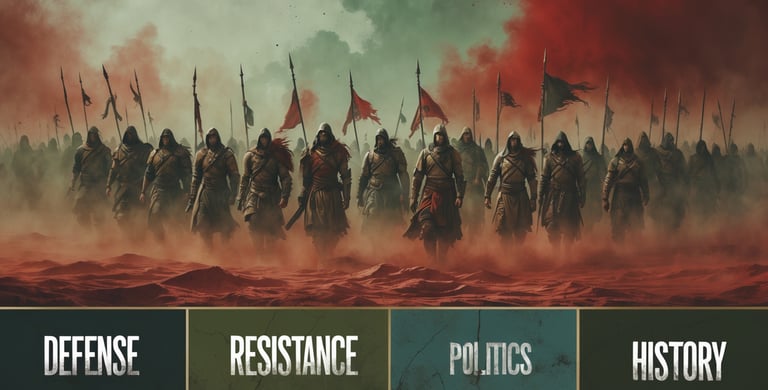Fortitude for Men in the Culture War
Sovereignty, Suffering, and the Stoic Love That Shapes Men and Nations
4FORTITUDED - DEFENSE, RESISTANCE, POLITICS, HISTORY
Fortitude for Men in the Culture War
Sovereignty, Suffering, and the Stoic Love That Shapes Men and Nations
“The tears of a righteous man do not weaken his armor—they baptize it.”
— Forge Psalms, Vol. III
Introduction
He sat alone on the porch, hands calloused, eyes burning.
He hadn’t cried in front of anyone in years—not from shame, but from necessity. Yet tonight, something in him cracked—not with weakness, but with clarity.
It was the cry that didn’t come from emotion—it came from mission.
From a love that would let his son hate him to save his future.
From a grief that would lose comfort to remain faithful.
From the burden of watching a nation call cowardice virtue and still choosing to bless it with restraint, not rage.
This was not a collapse. This was consecration.
The world mocks men who feel—but collapses without them.
The father who never weeps teaches his sons to break in silence.
The father who weeps rightly teaches his sons to reign without apology.
This is The Emotional Realm: not therapy, not sentiment—but sacramental feeling fused with unbreakable virtue.
From the West, Marcus Aurelius teaches us: Be like the cliff against which the wave continually breaks, yet it stands firm and tames the fury of the water.
From the East, the Psalms thunder: Those who sow in tears shall reap in joy.
A man who does not feel cannot love. A man who cannot endure feeling cannot lead.
Core Knowledge Foundation
Three mythic truths form the core of emotional sovereignty for men under siege:
1. Emotion Without Erosion
Masculine feeling is not a disorder—it is depth under discipline.
Stoicism does not mean suppression. It means command over reaction.
Feeling without erosion means channeling rage into protection, grief into prayer, tenderness into structure.
Weak men feel without form. Strong men form their feelings into oaths.
2. The Cry That Made You King
In every true story, the man becomes a king through pain endured, not pleasure multiplied.
The tears you refuse to feel become the tyrant your family must one day fight.
Grief unspoken becomes lawless rage. Grief consecrated becomes governance.
What you cry for becomes what you protect. What you protect becomes your realm.
3. Christian-Stoic Discipline of Emotional Sovereignty
Christ wept. Paul burned. David danced and fell. None of them broke.
Stoic philosophy and Christian theology agree: emotions are tools, not rulers.
You feel with control, hurt with clarity, and love with ferocity.
Theoretical Frameworks & Paradoxical Anchors
Christian masculine theology holds that emotion is the language of the heart, not the tyrant of the will.
Stoic ethics frames emotion as energy—neither good nor evil—only as noble as the actions it produces.
Together, they yield the Transcendent-Paradoxical Anchor:
To be unshaken, you must feel deeply. To lead in tenderness, you must first bleed in silence.
Advanced Insights & Reversals
Modern culture tells men to choose between:
Numbness (be unaffected)
Emotionalism (be overwhelmed)
But the sacred reversal is this:
A man is most dangerous when he loves rightly—and refuses to betray that love to rage or despair.
You must suffer—but with structure.
You must cry—but for something sacred.
You must feel, so your family does not fracture under the weight of your denial.
Contradiction Clause:
Only the man who can sit in sorrow without crumbling can rise in war without cruelty.
Critical Perspectives & Ethical Crossroads
Steelman the Therapeutic Critic: “Real men need emotional safe spaces, empathy, and expression without judgment.”
True—but that is not enough.
Safe spaces are transient. Your wife needs protection, not processing.
Your son needs your eyes to be clear during his panic, not collapsing with you.
Resonant Dissonance Principle #3:
If you do not crucify your emotions with truth, they will crucify your legacy.
This is not a war against emotion. It is a war against untethered emotion.
Emotion severed from discipline becomes a cultural cancer.
Emotion sanctified becomes kingly governance.
Decision Point:
Will you pass on wounds wrapped in silence?
Or will you pass on fire shaped into a hearth?
Embodiment & Transmission
What must be done—by the hand, the tongue, or the bloodline.
The Fortress Reflection Drill – Name the last emotion you hid. Write what truth it guarded. Burn the paper.
Battlefield Cry Session – Train alone. Push to tears. Speak a creed while breathless. Harden the voice of grief.
Controlled Tenderness Practice – Do one act of unexpected, gentle love (foot washing, forgiveness, touch) with no announcement.
Psalm Rewriting Ritual – Rewrite one Psalm in your hand, linking your sorrow to hope. Read aloud during adversity.
Emotional Armor Map – Define: What breaks you? What steadies you? What softens you? Share it once, with one man.
Legacy Grief Letter – Write one letter to your children explaining the pain you endured so they wouldn’t have to.
Cry as Catechism Drill – When grief comes, do not stop it. Instead, pray through it. Tie each sob to a virtue.
Hearthkeeper’s Touchpoint – Weekly emotional check-in with your wife or children—guarded by Scripture and sword.
Forged Restraint Fast – Commit to one week where every emotional trigger must be followed by silence, breath, and scripture.
Armor & Altar Day – Once monthly: a physical challenge, a spiritual lament, a family blessing. Repeat in sacred rhythm.
Final Charge & Implementation
This is your charge:
Feel. Fully.
Lead. Regardless.
Love. Like war.
Your emotions are not your enemy—they are your consecration.
Two Bold Actions:
Begin your Grief-Fortitude Journal. Let no sorrow go undocumented or wasted.
Teach your sons how to cry as kings, not victims. Show them that love can bleed and still swing the sword.
Sacred Question:
Am I hiding behind control—or forging emotion into action that sanctifies my house?
Remember:
Tears become tyranny when they are suppressed—and legacy when they are sanctified.


